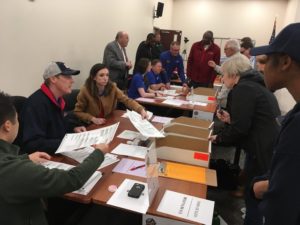Georgia Election Officials Accused of Destroying Evidence
The state's voting system was scrutinized last year when Georgia's election chief Brian Kemp narrowly beat Stacey Abrams for governor.ATLANTA—In a federal court filing, lawyers for election integrity advocates accuse Georgia election officials of intentionally destroying evidence that could show unauthorized access to the state election system and potential manipulation of election results.
Election integrity advocates and individual Georgia voters sued election officials in 2017 alleging that the touchscreen voting machines Georgia has used since 2002 are unsecure and vulnerable to hacking. In a court filing Thursday, they said state officials began destroying evidence within days of the suit’s filing and continued to do so as the case moved forward.
“The evidence strongly suggests that the State’s amateurish protection of critical election infrastructure placed Georgia’s election system at risk, and the State Defendants now appear to be desperate to cover-up the effects of their misfeasance — to the point of destroying evidence,” the filing says.
A spokeswoman for the secretary of state’s office, which oversees elections, denied the allegations.
The brief was filed Thursday as U.S. District Judge Amy Totenberg was holding a hearing on requests by the plaintiffs that she order the state to immediately stop using its current voting machines and switch to hand-marked paper ballots. That hearing is set to continue Friday.
In court Thursday, lawyers for the plaintiffs highlighted weaknesses identified in risk assessment reports by Fortalice Solutions, a cybersecurity firm hired by the secretary of state’s office. Fortalice CEO Theresa Payton testified that her team did find serious risks in their initial 2017 assessment but also said the secretary of state’s office had made progress toward fixing the problems by the time of a subsequent review last November.
The plaintiffs’ lawyers pointed out, however, that the assessment only covered general cybersecurity in the office and that Fortalice wasn’t asked to look at potential risks for election management systems or voting machines.
Judge Totenberg has previously expressed grave concerns about the vulnerability of the state’s election system and scolded state officials for being slow to respond to evidence of those problems, and on Thursday said she still has “worries about the integrity of the voting data system.”
Georgia’s voting system drew national scrutiny last year during the closely watched governor’s race in which Brian Kemp, a Republican who was the state’s top election official at the time, narrowly defeated Democrat Stacey Abrams.
A law passed this year and signed by Kemp provides specifications for a new system, which state officials said will be in place for the 2020 presidential election. But the state still plans to use the current machines for special and municipal elections this year and the plaintiffs fear the outdated machines will also be used in 2020 if a new system isn’t implemented in time.
Lawyers for the state have argued in court filings that new security measures have been put in place to protect the existing system, that the implementation of a new voting system addresses the judge’s concerns and that putting an intermediate hand-marked paper ballot system in place while the state is moving to a new voting system would be “an impossible burden” on state and local election officials.
In their brief Thursday, lawyers for the Coalition for Good Governance accused state officials of destroying computer servers from the Center for Election Systems at Kennesaw State University after a security hole there that exposed Georgia voters’ personal data and passwords used by county election officials was discovered. State lawyers then failed to ask the FBI for a copy of a forensic image the agency made of the server before it was wiped, despite saying they would, they say.
The brief also accuses state officials and their lawyers of deleting and overwriting data preserved on voting machine memories and on memory cards used to program the voting machines.
“After abundant notice of their well-known duty to preserve evidence, the State Defendants did not simply neglect to disable some automated purge function in their IT systems. Rather, they intentionally and calculatingly destroyed evidence,” the brief says. “Surely, to engage in conduct so odious that any junior lawyer would know it would expose them to sanctions, the evidence so disposed of must have been damning in the extreme.”
Secretary of state’s office spokeswoman Tess Hammock said allegations of destroying evidence are false.
“We look forward to vigorously defending ourselves from these spurious allegations meant to distract the Court from the fact that there is no evidence that supports plaintiffs’ outlandish theories,” she wrote in an email.
Many of the allegations stem from the time when Kemp was secretary of state before he became governor. A governor’s office spokeswoman, Candice Broce, declined to comment, referring questions to lawyers for state election officials, who also declined to comment.
Your support is crucial...As we navigate an uncertain 2025, with a new administration questioning press freedoms, the risks are clear: our ability to report freely is under threat.
Your tax-deductible donation enables us to dig deeper, delivering fearless investigative reporting and analysis that exposes the reality beneath the headlines — without compromise.
Now is the time to take action. Stand with our courageous journalists. Donate today to protect a free press, uphold democracy and uncover the stories that need to be told.






You need to be a supporter to comment.
There are currently no responses to this article.
Be the first to respond.